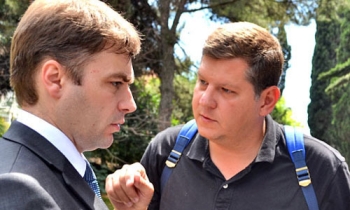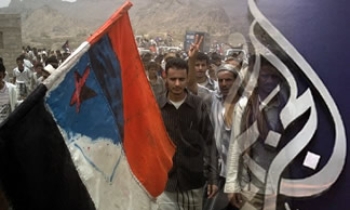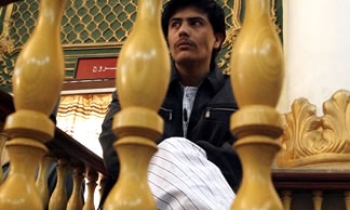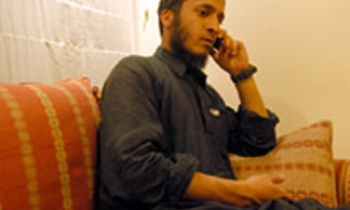BAGHDAD, Oct. 14 — A journalist for The Washington Post was shot and killed while reporting from a volatile neighborhood in southern Baghdad on Sunday, the newspaper said. The killing, an isolated act that appeared to have been deliberate, was one of at least nine in the capital Sunday.
The reporter, Salih Saif Aldin, 32, was shot once in the head, apparently at close range, said the newspaper’s Baghdad bureau chief, Sudarsan Raghavan. Other details of the killing remained unclear late Sunday night.
Mr. Saif Aldin, a divorced father of a 6-year-old girl, was killed in the same area of Baghdad where a journalist for The New York Times, Khalid Hassan, was fatally shot in July in what appeared to be a planned attack.
In the city of Ramadi in Anbar Province, more than 40 Shiite tribal and political leaders met with Sunni tribal leaders in a significant display of support for the Sunni alliance fighting against the insurgent group called Al Qaeda in Mesopotamia, a homegrown Sunni Arab extremist group that American intelligence agencies have concluded is foreign led.
The three-hour meeting, to which the Shiite political and tribal leaders traveled in American military helicopters, was organized by the Awakening Council, a coalition of Sunni tribes in Anbar that have begun fighting Al Qaeda in Mesopotamia for control of the province.
It was the first time that Shiite political leaders had traveled to Anbar to meet with the Sunni coalition at a gathering of sheiks.
Among the most prominent Shiite officials to attend were Amar al-Hakim, whose father leads one of the largest Shiite political parties in Iraq, and Hadi al-Ameri, the leader of the party’s armed wing, known as the Badr Organization.
Maj. Gen. Michael D. Barbero, the American military’s Joint Staff deputy director for regional operations, also attended the meeting, an indication of the importance with which American military leaders view any potential alliance of Sunni and Shiite tribes in the fight against Al Qaeda in Mesopotamia.
Several Sunni tribal leaders, including Abdul Sattar Buzaigh al-Rishawi, also known as Abu Risha, whose brother led the meeting, have been killed since they joined with the American military in fighting the insurgent group.
Three senior members of one such Sunni group, the Salahuddin Awakening Council, were killed Sunday near the northern oil city of Kirkuk, the Iraqi police there said.
Mr. Saif Aldin, the Washington Post reporter, was killed in the Saydia neighborhood of Baghdad, one of the last areas of the capital where Sunni insurgent fighters remain and have fought against the encroachment of Shiite militia fighters, American military officials said.
Local residents and Iraqi Army officials who arrived at the scene said that at the time he was killed, Mr. Saif Aldin was taking photographs on a Saydia street where several homes had been burned in recent fighting. There was no information about who killed him or why.
“He’d gone to do some reporting, and the next thing we knew we got a call from someone who had his cellphone,” who turned out to be a police officer who had arrived on the scene, Mr. Raghavan said. “He said Salih was dead.”
Originally from Tikrit, where he started as a freelance reporter for The Post, Mr. Saif Aldin moved to Baghdad and began working as a staff reporter in early 2004, said Mr. Raghavan, the bureau chief.
He also said that Mr. Saif Aldin, who was once severely beaten in Tikrit after he ignored threats to leave the city or be killed, was known for his tremendous courage in covering some of the worst areas of the city.
For security reasons, he wrote under a tribal name, Salih Dehema.
“Salih’s death reminds us once again of the central role that Iraqi journalists and others have played in our coverage of the war,” David E. Hoffman, The Post’s assistant managing editor for foreign news, said in a statement. “They have often borne the risks and made the sacrifices in pursuit of truth. We grieve at Salih’s loss, and that of all journalists killed in this conflict, and salute their determination and courage.”
At least 118 journalists have been killed in Iraq since the beginning of the war in 2003, according the Committee to Protect Journalists; at least 96 of those journalists were Iraqis.
Elsewhere in Baghdad, a car bomb exploded in a busy traffic circle downtown, killing eight people and wounding 15, an Interior Ministry official said.
Paul von Zielbauer reported from Baghdad, and Andrew Kramer from Ramadi. Reporting was contributed by Qais Mizher, Alissa J. Rubin, Mudhafer al-Husseini and Wisam A. Habeeb from Baghdad.









